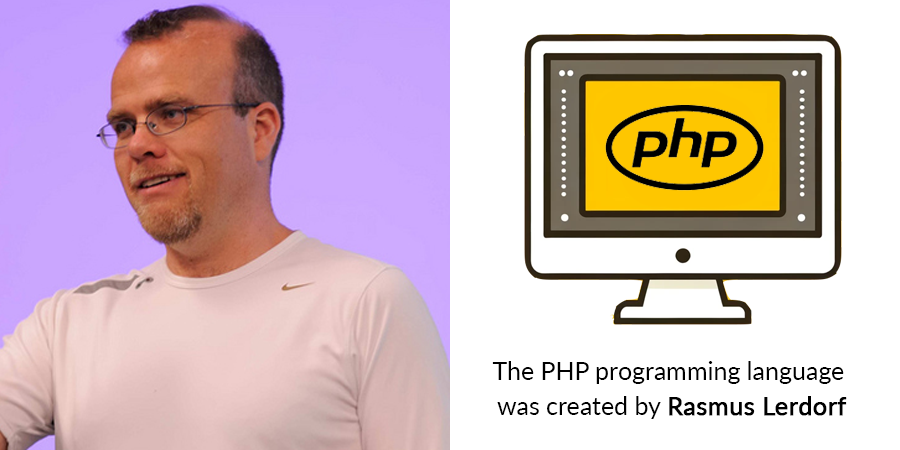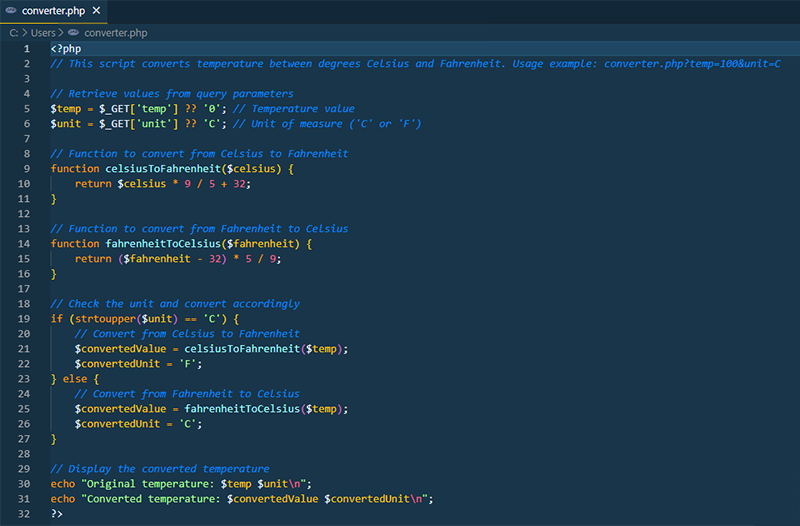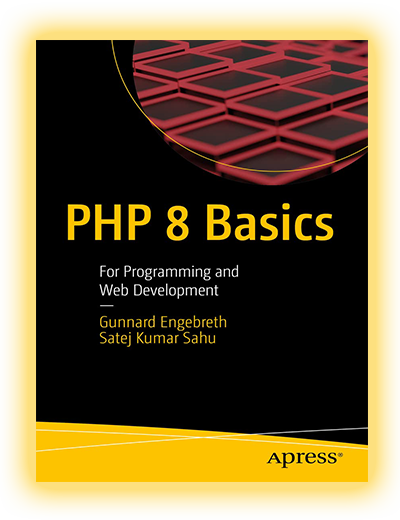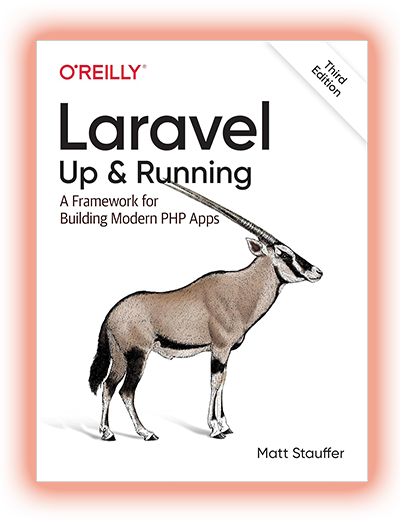Listen to the article - it is faster than reading!
Even today, the PHP programming language maintains its relevance due to its flexibility and power. PHP is a server-side programming language, meaning its code is executed on the server rather than the user's computer. This distinguishes it from languages like JavaScript, which runs in the user's browser. This feature makes PHP an ideal tool for developing web applications requiring server-side data processing, including form submission, authorization, database interaction, and much more.
What is PHP?
The acronym PHP initially stood for Personal Home Page, but it was later redefined as Hypertext Preprocessor, reflecting its capabilities for processing hypertext. Initially designed for developing dynamic web pages, PHP programming language has undergone significant changes over time, becoming a comprehensive tool for creating scalable applications. A notable feature of PHP is its ability to be embedded directly into HTML code, allowing developers to easily create dynamic content.
Who Invented the Programming Language PHP?
The PHP programming language was created by Danish programmer Rasmus Lerdorf in 1995. Initially, it was a simple set of scripts for tracking visitors to his personal web page.

Rasmus Lerdorf, one of the creators of PHP programming language
What is PHP in Web Development?
In the context of web development, PHP is considered a key element for creating dynamic and user-interactive applications. Thanks to its ability to integrate with numerous technologies and support a wide range of databases, PHP offers developers the flexibility and power to implement complex solutions.
This programming language has robust capabilities for working with databases, file systems, and for processing and storing data, making it an ideal tool for applications such as e-commerce, portals, content management systems, and much more.
With PHP, developers can easily create complex web solutions, offering users a rich and interactive experience. Thanks to broad support and an active community, PHP continues to evolve, incorporating new features and improvements for modern websites.
What is PHP Programming Used For?
PHP is one of the most popular programming languages in the world of web development. Its unique flexibility and powerful functionalities make it an indispensable tool for creating a wide range of web applications. From blogs and forums to complex corporate systems, this programming language is used for various tasks, ensuring high performance and ease of use.
What Does PHP Stand for?
-
Website and Application Development.
PHP is the foundation of many websites and applications due to its ability to interact with databases, process forms, manage sessions, and much more, making it an ideal choice for creating dynamic pages and applications with rich functionality. - Forum Development.
This programming language is actively used to create forums where users exchange messages and discuss various topics. -
E-commerce Implementation.
PHP is used to develop complex e-commerce platforms that support order processing, product management, and integration with payment systems, essential for online stores. -
Email Newsletters Creation.
This language is utilized for automating the sending of emails to users, facilitating effective communication with customers. These include news newsletters, order notifications, or personalized offers. -
Data Processing and Storage.
It is used for processing data received from users through forms, their validation, and storage in a database, forming the basis for many websites and applications. -
Creating RESTful APIs.
PHP is widely used for creating RESTful APIs that allow web and mobile applications to exchange data with the server in a standardized format, making the language an essential tool in modern application development. -
Content Management Systems (CMS) Creation.
Due to its flexibility and power, PHP is widely used for developing popular content management systems like WordPress, Joomla, and Drupal, which facilitate content creation, editing, and management on websites.
Table of common PHP-based CMS: overview and capabilities
|
CMS |
Description |
Key Features |
|
The world's most popular CMS, known for its ease of use and extensive plugin ecosystem. |
- Extensive themes and plugins |
|
|
Offers a balance between ease of use and extensibility, making it a good choice for many websites. |
- Strong community support |
|
|
Known for its robustness and scalability, ideal for complex, content-heavy, and high-traffic websites. |
- High scalability |
|
|
A leading eCommerce platform, offering powerful tools for building online stores. |
- Advanced eCommerce features |
|
|
An efficient and innovative eCommerce solution with all the features you need to create an online store. |
- User-friendly backend |
PHP programming language provides developers with a powerful tool for implementing their creative and technical ideas. Its versatility and ease of learning make the language accessible for a wide range of projects, from simple web pages to complex applications and systems.
How to Do Programming in PHP?
PHP programming is considered one of the key skills in the arsenal of a modern web developer. It's not just the process of writing code; it's the art of creating dynamic and interacting websites and applications that automatically update and adapt to user needs without the need to reload the page.
PHP programming opens up wide possibilities for web application development, from simple scripts to complex corporate systems. PHP code is executed on the server before the result is sent to the client. This allows it to perform complex operations, such as form processing, database interaction, and session management, before the result is displayed in the user's browser.
What is a PHP program?
A PHP program is a script or series of scripts written in PHP, designed to perform a specific set of tasks on the server. These programs can perform a wide range of functions, from sending and processing form data to generating dynamic web pages in real-time. The advantage of PHP lies in its ability to easily integrate with most web technologies and databases, making it an ideal choice for developing cross-platform applications.
A PHP program also stands out for its simplicity and accessibility. The language's syntax is easy to read and understand, making it attractive for beginner developers. At the same time, it offers advanced features and capabilities that meet the needs of experienced programmers.
This programming language supports many databases, such as MySQL, Oracle, and PostgreSQL, providing flexibility in developing databases for web applications.

Simple example of PHP program
How to Learn PHP Programming?
Learning the PHP programming language is an important step for any newbie in web development. It offers a powerful toolkit for creating dynamic and interactive web applications. Here are some strategies and recommendations that will help you master this language.
An Easy Way to Learn PHP Programming
Learning PHP might seem like a daunting task, however, there are methods that simplify the learning process:
-
Start with the basics.
Understanding the fundamentals of programming and PHP syntax is critically important. Study variables, loops, conditional statements, and functions. - Practice through projects.
Create small projects, such as a blog or a simple content management system, to apply knowledge practically. -
Utilize online resources.
There are numerous free educational resources, courses, tutorials, and free books on PHP. Spend time studying and practicing with these resources. - Read and analyze code.
Study the code of existing projects. GitHub is an excellent place to start, where you can find open-source projects. -
Feedback and learning with the community.
Join PHP developer communities on forums, social networks, or platforms like Stack Overflow. Ask questions and share your projects for feedback. -
PHP documentation.
The official documentation is one of the best resources for learning the language. It contains detailed function descriptions, code examples, and best practices.
Learning PHP requires time and patience, but thanks to its widespread popularity and community support, you will find numerous resources and tools for learning.
Conclusion
PHP remains one of the most powerful and flexible tools in a web developer's arsenal. This language continues to evolve, incorporating new features and improvements, ensuring its relevance and appeal for modern web projects. Thanks to broad database support, integration with other technologies, and an active community, PHP provides developers with all the necessary resources to realize their ideas.
In conclusion, whether you are a beginner programmer or an experienced developer, PHP offers tools that will help achieve goals in the world of web development, providing flexibility and scalability to adapt to future requirements and new trends.
FAQ Section
Question 1: Can I use PHP to create mobile applications?
Directly, this language is not used for developing mobile applications. However, it can be used to create the server-side part of a service, with which a mobile application interacts.
Question 2: Is PHP safe for developing web applications?
PHP, like any other programming language, will be safe if the best development practices and security measures are implemented.
Question 3: What are the best security practices when working with PHP?
To ensure the security of applications, it is necessary to follow several recommendations. Namely, using current versions of PHP and third-party libraries, applying password hashing, filtering, and sanitizing input data to prevent XSS and SQL injection attacks, and using HTTPS to encrypt data.
Question 4: What are some alternatives to PHP?
As alternatives to PHP, languages such as Python (using Django or Flask), Ruby (Ruby on Rails), and JavaScript (Node.js) can be considered.
Question 5: What type of programming language is PHP?
PHP is considered a server-side scripting programming language. This means that the code is executed on the server before the result of its execution is sent to the user's web browser.
Question 6: Why would programming in PHP be needed when developing a web site?
PHP programming allows for the creation of dynamic and interactive sites. It has flexibility in interacting with databases, managing user sessions, processing forms, and performing many other tasks necessary for modern websites.
Question 7: What is advanced PHP programming?
Advanced PHP programming includes using complex aspects of the language, such as Object-Oriented Programming (OOP), working with databases through PDO (PHP Data Objects), creating and using RESTful APIs, and implementing security measures to protect web applications. This level of programming requires a deep understanding of PHP and its capabilities.
Question 8: What PHP frameworks are most popular today?
Among the most popular and widely used PHP frameworks are Laravel, Symfony, and CodeIgniter. Laravel attracts developers with its elegance and extensive functionality, Symfony with its flexibility and power, and CodeIgniter with its lightweight and ease of use.





